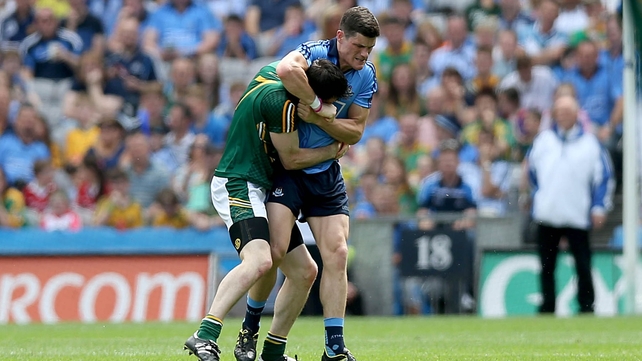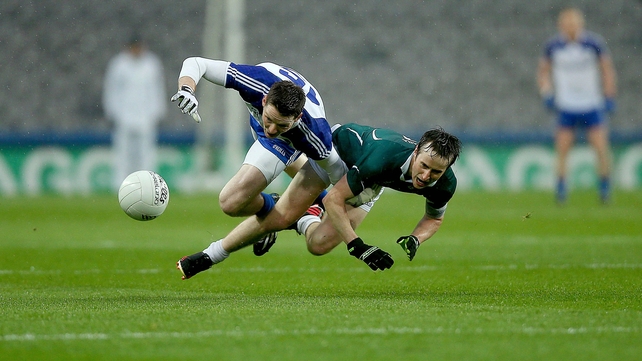By Rory O'Neill
Series Editor, The Sunday Game
The back door needs to be shut and a major revamp of the Senior Football Championship is required to reinvigorate a stale format.
Every year that call grows louder; every year it falls upon deaf ears. Who's really listening? Is there a genuine appetite for change amongst GAA members or is it a media construct?
When the draw for next year’s championship was made a couple of weeks ago the usual cries of derision and dissatisfaction were heard howling around the airwaves, message boards and social media. It's a record on long play at this stage.
Nobody ever complained about the provincial championships prior to the back door being opened.
Back then, the provincial finals were considered sacrosanct, untouchable, special marquee days on the calendar, to be feted through the month of July. Now they're cast as bêtes noires, decried as the stumbling blocks to a truly progressive egalitarian system. It’s hardly that simple, is it?
The Munster Championship comes in for a lot of stick but with Cork and Kerry anchoring the province you have, at the very least, two genuine contenders at national level.
Can the same be said of Connacht? A revival in Galway would be most welcome and in Shane Walsh they have one of the most exciting prospects around.

Leinster has become alarmingly uncompetitive. Dublin, with nine of the last ten titles, have never enjoyed a period of such total domination.
A lack of competition is not a charge you can level at the Ulster Championship, which remains a vivid reminder of what the provincial championships used to stand for.
It is patently unfair that Donegal, as defending Ulster Champions and beaten All-Ireland finalists, have been cast in to the qualifier round, with Armagh, Tyrone, Derry and Down for company on the same side of the draw. Unfortunately, as things stand, that’s the luck of the draw.
The GAA Director General, in an interview with RTÉ some years ago, said this: "It is not a realistic ambition for every county to win the All-Ireland. It is, however, a realistic ambition for every county to win a provincial title and for that reason in my view they should stay."
That is a noble and perfectly reasonable standpoint, and remain they should, but: in what format?
The reason the back door was opened originally was straightforward. Teams trained for six months, played one match and were beaten, then waited another six months before the process repeated itself. Crazy stuff. The preparation put in at inter-county level was deserving of more than 70 minutes of championship football a year. Most rational observers concede as much.
The problem is what we have now is a halfway house: it has neither the cut and thrust of the old straight knockout format nor the equity of an open draw. It's trying to serve two functions at once and comes up a little bit short on both. After 13 years of qualifiers, the novelty factor has worn off.
The early rounds of the back door have become cumbersome, drawn out and predictable. Unless two Ulster teams get drawn together the qualifiers don't spark until Rounds 3 and 4; even then they can be underwhelming. There were 24 matches through the qualifiers in 2014. Do any stand out? Monaghan v Kildare in Round 4 at a push.

The other big problem with the back door is the level of uncertainty it creates for club fixtures within a county. The new A/B draw system was brought in to combat this, and to try to reduce the gap between when a team gets knocked out of the provincial championship and the commencement of their qualifier run but the imperfections remain.
On All-Ireland final night Ciarán Whelan pointed out a simple yet alarming fact: we have a championship season that lasts the guts of four months but only really grabs the public’s imagination for about four to six weeks. That's a design fault.
Too often we hear that the championship only really begins on the August Bank Holiday weekend. When you consider the myriad of problems that exist at club level as regards generating a coherent calendar of fixtures, to then hear the championship only starts in August gives rise to the question: what’s going on during May, June and July?
Parochial rivalries, Cork and Kerry, Galway v Mayo, Dublin v Meath: these have been built up over the 130-year existence of the association. You can’t just jettison them without having an adequate replacement.
And spare us ‘The Champions League’ analogy. That's another well-worn record that doesn't stack up.
UEFA continues to experiment and incentivise through increased prize money in the group stages in their efforts to infuse the early part of their flagship competition with meaning and substance.
"We have a championship season that lasts the guts of four months but only really grabs the public’s imagination for about four to six weeks."
Pre-Christmas Champions League football sees a lot of meaningless matches, lop-sided fixtures and predictable results. Most groups are decided well in advance of their conclusions and the usual suspects eventually make the knockout stages. Sound familiar?
Paraic Duffy has heard all of this many times before. His response has always been the same: "I have not as yet seen an alternative put forward from any source that could meet the various needs of the Association and, as such, I don't foresee any major changes in our main championship structures."
There have been many suggestions sent into us over the years when this topic has cropped up but what follows is about the best we have seen (with a few in-house amendments made) as a viable alternative.
The provincial championships could be run off using the Pool/Group format, with teams seeded based on how they’ve finished in that year’s league campaign.
There would be two groups of three in Munster and Connacht, three groups of three in Ulster and four groups of three in Leinster.
London and New York would play off to see who enters into the Connacht Championship, which would be split into two groups of three.
Group winners would qualify for the provincial final in Munster and Connacht.
In Ulster, group winners would qualify for the semi-finals with the best runner-up taking the fourth slot.
The four group winners in Leinster qualify for the semi-finals and on you go.
By the time you get to the provincial finals you would be down to the last eight teams in the country.
If you wanted to give the beaten Provincial Finalists a second chance then, via a slimmed down version of the back door at All-Ireland quarter-final stage, so be it.
Based on this year’s league campaign this is how the 2014 Championship draw would have looked like.
*Brackets denotes league finishing position for 2014
Munster
| Roinn 1 | Roinn 2 |
| Cork [1]* | Kerry [6] |
| Limerick [22] | Tipperary [25] |
| Clare [26] | Waterford [29] |
Connacht
| Roinn 1 | Roinn 2 |
| Mayo [3] | Galway [14] |
| Roscommon [20] | Sligo [22] |
| Leitrim [28] | London [31] |
Ulster
| Roinn 1 | Roinn 2 | Roinn 3 |
| Derry [2] | Tyrone [5] | Donegal [9] |
| Monaghan [10] | Down [12] | Armagh [15] |
| Cavan [17] | Fermanagh [19] | Antrim [30] |
Leinster
| Roinn 1 | Roinn 2 | Roinn 3 | Roinn 4 |
| Dublin [4] | Kildare [7] | Westmeath [8] | Meath [11] |
| Laois [13] | Louth [16] | Wexford [21] | Longford [23] |
| Offaly [24] | Wicklow [27] | Carlow [32] | Kilkenny [33] |
The benefits to such a system:
- Each team is guaranteed a minimum of two matches, which circumvents the reason for introducing the back door while - far more importantly – making for a much more rigid calendar of fixtures
- The seeding system derived from the leagues gives the spring competitions a new significance, as opposed to the four-month preamble they tend to be now until the championship starts
- The provincial championships are reinstated as something meaningful.
- Provincial finals become huge occasions once again
- It should also allow for the championship to begin in May with a bit more of a bang than the usual whimper we tend to see
- Opting for quality over quantity through the summer will help the fixture planners, go some way to tackling burnout and who knows, might even save the dual player from total extinction
- It also provides scope for the introduction of elements like bonus points and arms legislators with another tool to encourage attacking play. Score difference will become extremely important where three teams finish level on points as is certainly likely in Ulster
There are negatives of course and the principal one being financial. It will mean fewer games overall, and so a little less money.
Under the current system it takes, before replays, 60 matches to complete the championship. This system takes that number down to roughly 48: will reduced numbers through the turnstiles prove too significant a loss for gains to be made on the pitch?

